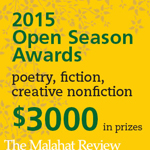2015 Open Season Awards: Book Prizes!
 Deadline: November 1, 2014 (postmarked) Deadline: November 1, 2014 (postmarked)
Prize: $3,000 over three categories (poetry, fiction, creative nonfiction)
Entry fee:
$35 CAD for Canadian entries
$40 USD for entries from the USA
$45 USD for entries from elsewhere
Additional entries are $15 CAD (from anywhere).
***New this year*** Send us an entry between October 1-15, and you'll be entered into a draw to win a 3-book prize pack! Books include poetry judge Jan Conn's Edge Effects, fiction judge Cynthia Flood's Red Girl Rat Boy, and creative nonfiction judge David Carpenter's Welcome to Canada. Read about the Open Season contest judges on our website.
Send us your best poetry, fiction, and/or creative nonfiction by November 1. With $3,000 in prizes, it's no wonder this is our most popular contest all year!
Full contest guidelines available on the Malahat website.
Open Season Awards: Catch-Up Interviews with 2014's Winners
Joelle Barron, 2014 Poetry Winner
 Malahat editorial assistant stephen e. leckie talks with Joelle Barron about life since winning the Open Season Award for Poetry in 2014. Malahat editorial assistant stephen e. leckie talks with Joelle Barron about life since winning the Open Season Award for Poetry in 2014.
SL: I observed a subtle eroticism, albeit a lonely one, in the place names, the body parts, and the changing seasons. How does your speaker's identity reveal itself, in relation to her experience(s)?
JB: My idea for the speaker was that she was caught in this limbo of attraction and admiration for Glenn Gould...she wants to be him, but she hasn't been afforded the same opportunities as he has. She's also attracted to his talent and strangeness, where he sees her as a sort of living artifact. He takes advantage of her, perhaps without realizing it, and when it's all over, she is left in the same place she was before she met him, while he gets to move on.
Read the rest of Joelle's interview on the Malahat website.
Tajja Isen, 2014 Fiction Winner
 Malahat fiction board intern Senica Maltese talks with 2014 Open Season Fiction Award Winner, Tajja Isen, about academia, psychoanalytic theory, and how she views the writing life one year after her win. Malahat fiction board intern Senica Maltese talks with 2014 Open Season Fiction Award Winner, Tajja Isen, about academia, psychoanalytic theory, and how she views the writing life one year after her win.
SM: How has winning this award affected your creative psyche? Have you noticed any shifts in your career as a writer, or your life in general since winning?
TI: Winning this award was extremely nourishing to my creative psyche, not least because it was my first publication. It nudged open the door in my head marked "writer" and invited me to try squeezing through a bit further. I’ve since become even more serious about my writing. I sit down in front of the computer with greater conviction and regularity, and submit pieces with more confidence, which are all wonderful gifts.
Read the rest of Tajja's interview on the Malahat website.
Francophone Poetry Contest Translation Interview: Donald McGrath
 Malahat editorial assistant stephen e. leckie talks with Donald McGrath, winner of the one-time poetry translation contest, les poésies francophones du Canada. Donald's rendition of Robert Melançon's "Elegie écrite dans le parc Notre-Dame-de-Grâce" was chosen as the winning poem by contest judge Donald Winkler, and will be published in our special translation issue, #188, this autumn. Malahat editorial assistant stephen e. leckie talks with Donald McGrath, winner of the one-time poetry translation contest, les poésies francophones du Canada. Donald's rendition of Robert Melançon's "Elegie écrite dans le parc Notre-Dame-de-Grâce" was chosen as the winning poem by contest judge Donald Winkler, and will be published in our special translation issue, #188, this autumn.
SL: What inspired you about Robert Melançon's "Elégie écrite dans le parc Notre-Dame-de-Grâce"?
DM: I came to it while in the process of translating Robert’s collection L’Avant-printemps à Montréal. I liked the poem’s evocation of dark winter evenings in the city and the emotional darkness in it as well. When the speaker dismisses the dire conclusions he has come to as "hackneyed tropes," it is not to replace them with something more uplifting. He seems rather to have reached such a degree of disillusionment that the only thing left to do is something prosaic, "sensible," namely, return home so as not to catch cold. It’s a dispiriting perception but an emotionally honest one.
Read the rest of Donald's interview on the Malahat website.
Debut Short Story Collection Interview: Matt Rader
 Former fiction board member Matthew Hooton talks with poet and short story writer Matt Rader about his debut fiction collection, What I Want To Tell Goes Like This, which includes his 2014 Founders' Award-winning story, "All This Was A Long Time Ago." Former fiction board member Matthew Hooton talks with poet and short story writer Matt Rader about his debut fiction collection, What I Want To Tell Goes Like This, which includes his 2014 Founders' Award-winning story, "All This Was A Long Time Ago."
MH: Is there anything about the book's content or creation that might not be immediately apparent? Any secrets you'd like to let us in on?
MR: The collection alternates between contemporary and historical stories set in the Comox Valley on Vancouver Island (or else in transit on way to the Comox Valley). One thing that might not be immediately apparent is that several stories share a specific location in the valley. For example, the first story, "The Laurel Whalen," is set on a beach where a ragtag fleet of decommissioned commercial ships act as a breakwater.
Read the rest of Matt's interview on the Malahat website.
|